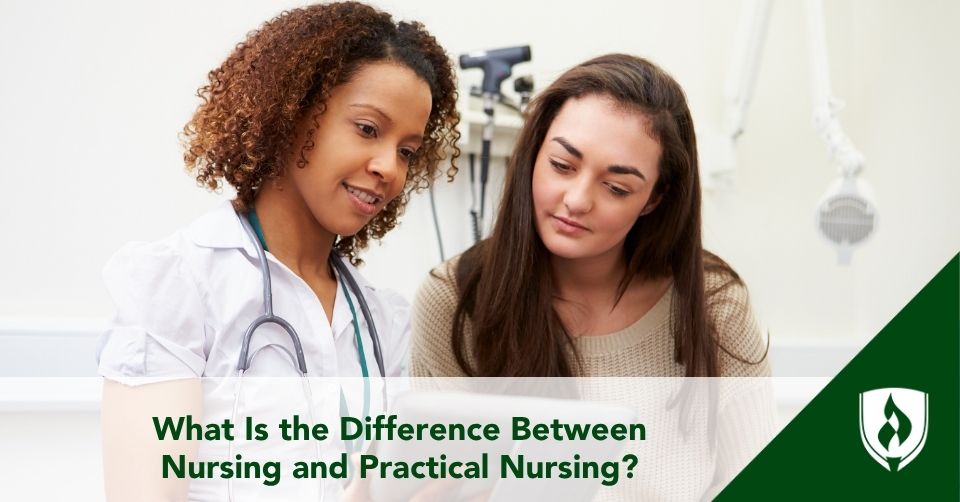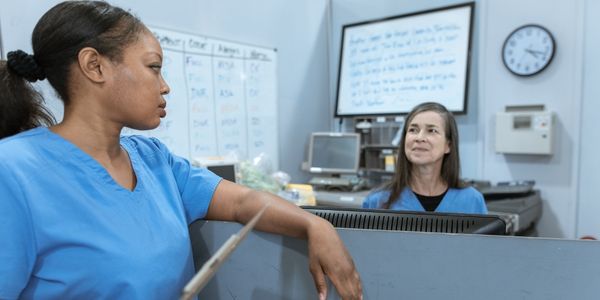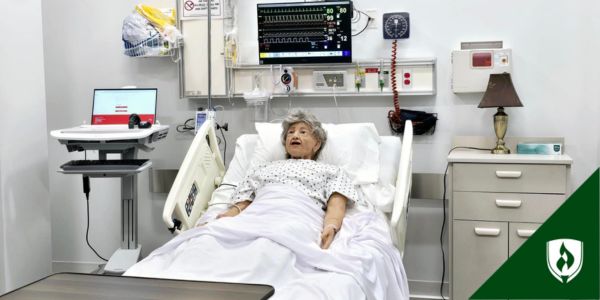What Is the Difference Between Nursing and Practical Nursing?
06/26/2025

Two paths lead to one goal — becoming a nurse. The nursing career field includes a wide range of roles. If you're motivated to help others, you’ll first need to decide between two primary entry points: Practical nursing or professional nursing.
Both are excellent starting points but require different educational requirements and lead to distinct job responsibilities. Depending on your life circumstances and career goals, one path may be a better fit. To help you decide, here's a breakdown of practical and professional nursing with the most current data available, covering everything from RN salaries to major differences in job duties.
What Is Practical Nursing?
Practical nurses include licensed practical nurses (LPNs) and licensed vocational nurses (LVNs). While LPN is the standard term in most states, LVN is used in California and Texas. Licensed practical nurses (LPNs) and licensed vocational nurses (LVNs) provide essential basic patient care in various healthcare settings and medical facilities. Their scope of practice may vary slightly from state to state. Regardless of location, practical nurses play a crucial role on any healthcare team alongside other medical professionals.
If you pursue practical nursing, prospective LPNs can earn a practical nursing diploma1 in as few as 12 months through an accredited nursing program. After graduation from LPN programs, you’ll need to pass the Next Generation NCLEX-PN exam, which has been in place since April 2023.2 The updated NGN NCLEX-PN exam evaluates clinical judgment and decision-making, better reflecting real-world nursing challenges in the healthcare industry.
What Do LPNs Do?
Licensed practical nurses are responsible3 for taking vital signs, feeding, dressing, transporting patients, assisting with procedures, and collecting samples for diagnostic tests. An LPN performs essential basic care duties and spends significant time with patients, providing both physical and emotional support. LPNs observe patients closely and document their patient's medical history and current conditions. They also assist with administering medications, particularly oral medications, under supervision.
Typically, LPNs work under the supervision of physicians and registered nurses but enjoy a degree of autonomy in their patient care responsibilities. The LPN duties include monitoring patient's condition, assisting with physical exams, and operating basic medical equipment. Understanding these job responsibilities is crucial for prospective nurses considering this career path.
Where Can LPNs Work?
Licensed practical nurses are employed4 across a wide range of healthcare settings:
- Nursing facilities and residential care facilities
- Home health care services
- Outpatient care centers and other medical facilities
- Assisted living communities
- Psychiatric and substance abuse hospitals
- Physician offices
- Intensive care unit support roles
According to the Bureau of Labor Statistics, as of 2023, only about 35%4 of LPNs work in nursing homes. The profession is expanding into outpatient care and home health as more patients seek treatment closer to home. LPNs can also find employment in physicians’ offices, home health care agencies, rehabilitation clinics, hospitals or ambulatory surgical centers.
How To Become an LPN
To become an LPN, you must complete a state-approved nursing program,5 which includes both classroom instruction and clinical hours. Clinical rotations give students hands-on experience under supervision. Coursework at Rasmussen University may include:
- Nutritional Principles in Nursing
- Family Nursing
- Psychosocial Nursing
After graduation, you'll take the NGN NCLEX-PN exam. Once licensed, you'll be ready to begin your career as an LPN.
LPN Career Path and Career Advancement
After gaining experience, LPNs may advance into specialized care or team leadership roles. Many continue their education by enrolling in LPN-to-RN bridge programs, earning either an associate degree in Nursing (ADN) or a Bachelor of Science in Nursing (BSN).6 These programs help prepare you to take the NCLEX-RN® licensing exam.7
What Is Professional Nursing?
On the professional nursing track, you have the option8 to either earn an ADN9 or a Bachelor of Science in Nursing (BSN)10 to become a registered professional nurse. You’ll have to pass the National Council Licensure Exam (NCLEX-RN®) after graduation to become a licensed RN, regardless of which degree you earn.
Compared to LPNs, registered nurses have a broader scope of practice and increased responsibility in patient care. RNs often work in specialized departments,11 such as neonatal intensive care units (NICU), emergency departments, or surgical units, and may work with cancer patients or other specialized populations.
What Do RNs Do?
Registered nurses assess12 patient history and symptoms, develop and implement care plans, and administer treatments and medications. They consult with physicians and other medical professionals and play a major role in educating patients and families on care practices and rehabilitation. RNs tend to have more complex job duties compared to practical nurses, including comprehensive patient assessments and coordinating care with other healthcare team members.
The RN educational requirements may prepare nurses for expanded responsibilities, including advanced patient care techniques and critical thinking skills needed in various medical facilities.
Where Can RNs Work?
According to the BLS, as of 2023, registered nurses work13 in a variety of environments:
- Hospitals (58%)
- Ambulatory healthcare services (19%)
- Government facilities (6%)
- Nursing and residential care facilities (5%)
- Educational services (3%)
RNs may also find employment in schools, correctional facilities, clinics, and the military. The healthcare settings for registered nurses are more diverse than those typically available to practical nurses.
How To Become an RN
You can become an RN by completing either an ADN or BSN program and passing the NGN NCLEX-RN®. A BSN offers more comprehensive coursework in public health, leadership, and nursing research.
The RN Career Path
While both ADN and BSN graduates earn the same license, BSN-prepared nurses often qualify for leadership and specialized positions. BSNs may go on to pursue a Master of Science in Nursing (MSN)14 and become advanced practice registered nurses, including roles as nurse practitioners, educators, administrators, or nurse anesthetists. RN-to-BSN programs are available for ADNs looking to advance their careers in the healthcare industry.
Understanding RNs and LPNs: Key Differences
When comparing RNs and LPNs, several major differences emerge:
Educational Requirements: LPN programs typically require 12 months of training, while RN programs require either a 2-year associate degree or 4-year bachelor's degree.
Scope of Practice: Licensed practical nurses provide basic patient care under supervision, while registered nurses have broader autonomy in patient assessments and treatment planning.
Career Advancement: RNs have more opportunities for specialization and advancement, including paths to become advanced practice registered nurses.
Work Settings: Both work in similar healthcare settings, but RNs have access to more specialized roles.
Making an Informed Choice in Nursing
The nursing field offers diverse opportunities to begin a meaningful career working with patients and other medical professionals. Now that you understand the updated differences between practical and professional nursing, including the various educational requirements and job responsibilities, you can make an informed decision about your future.
Whether you choose to work in nursing facilities, physician offices, or other medical facilities, nurses are in demand, and the satisfaction of helping others and saving lives is incomparable. Both paths offer solid career outlook and opportunities to make a meaningful difference in patient care.
If you think practical nursing is the perfect path for you, learn more about the daily duties of an LPN.15
If professional nursing sounds like a better fit, get the inside scoop on life as an RN.16
EDITOR’S NOTE: This article was originally published in 2012. It has been updated to include information relevant to 2025.
NCLEX-RN® is a registered trademark of National Council of State Boards of Nursing, Inc. 111 East Wacker Drive Suite 2900 Chicago, ILLINOIS UNITED STATES 60601
1Rasmussen University, "What Is a Licensed Practical Nurse (LPN)?" available at https://www.rasmussen.edu/degrees/nursing/practical-nursing/ (visited May 30, 2025).
2National Council of State Boards of Nursing, "Next Generation NCLEX," available at https://www.nclex.com/next-generation-nclex.page (visited May 30, 2025).
3Bureau of Labor Statistics, U.S. Department of Labor, Occupational Outlook Handbook, Licensed Practical and Licensed Vocational Nurses, available at https://www.bls.gov/ooh/Healthcare/Licensed-practical-and-licensed-vocational-nurses.htm#tab-2 (visited May 30, 2025). Employment conditions in your area may vary.
4Bureau of Labor Statistics, U.S. Department of Labor, Occupational Outlook Handbook, Licensed Practical and Licensed Vocational Nurses, available at https://www.bls.gov/ooh/Healthcare/Licensed-practical-and-licensed-vocational-nurses.htm#tab-3 (visited May 30, 2025). Employment conditions in your area may vary.
5Rasmussen University, "How to Become an LPN: 5 Steps to Earning Your Scrubs," available at https://www.rasmussen.edu/degrees/nursing/blog/how-to-become-lpn/ (visited May 30, 2025).
6Rasmussen University, "What Is a Bachelor of Science in Nursing (BSN)?" available at https://www.rasmussen.edu/degrees/nursing/bachelor-science-nursing-bsn/ (visited May 30, 2025).
7Rasmussen University, "NCLEX Tips Beyond the Review Books: What Your Instructors Want You to Know," available at https://www.rasmussen.edu/degrees/nursing/blog/nclex-tips-beyond-review-books/ (visited May 30, 2025).
8Rasmussen University, "ADN vs. BSN: Which Nursing Degree Is Right for You?" available at https://www.rasmussen.edu/degrees/nursing/blog/adn-vs-bsn/ (visited May 30, 2025).
9Rasmussen University, "What Is Professional Nursing?" available at https://www.rasmussen.edu/degrees/nursing/professional-nursing/ (visited May 30, 2025).
10Rasmussen University, "RN to BSN: What You Need to Know About This Nursing Degree Path," available at https://www.rasmussen.edu/degrees/nursing/rn-bsn/ (visited May 30, 2025).
11Rasmussen University, "16 Types of Nurses Employers Are Looking to Hire," available at https://www.rasmussen.edu/degrees/nursing/blog/types-of-nurses-employers-are-looking-to-hire/ (visited May 30, 2025).
12Bureau of Labor Statistics, U.S. Department of Labor, Occupational Outlook Handbook, Registered Nurses, available at https://www.bls.gov/ooh/healthcare/registered-nurses.htm#tab-2 (visited May 30, 2025). Employment conditions in your area may vary.
13Bureau of Labor Statistics, U.S. Department of Labor, Occupational Outlook Handbook, Registered Nurses, available at https://www.bls.gov/ooh/healthcare/registered-nurses.htm#tab-3 (visited May 30, 2025). Employment conditions in your area may vary.
14Rasmussen University, "What Is a Master of Science in Nursing (MSN)?" available at https://www.rasmussen.edu/degrees/nursing/master-science-nursing/ (visited May 30, 2025).
15Rasmussen University, "What Does an LPN Do? A Closer Look at These Versatile Healthcare Professionals," available at https://www.rasmussen.edu/degrees/nursing/blog/what-does-an-lpn-do/ (visited May 30, 2025).
16Rasmussen University, "What Does a Registered Nurse Do? A Look at the RN Role," available at https://www.rasmussen.edu/degrees/nursing/blog/what-does-a-registered-nurse-do/ (visited May 30, 2025).



